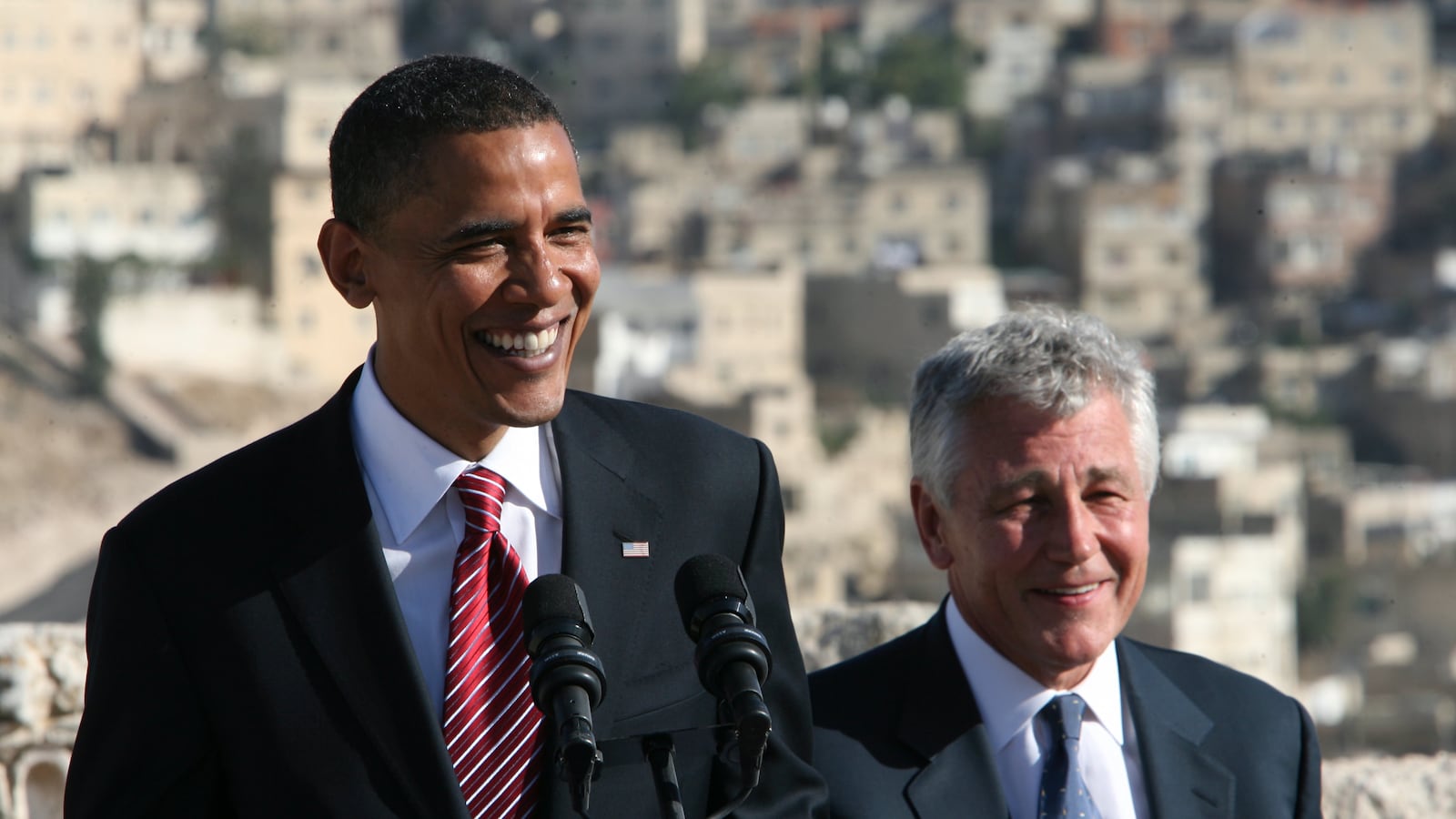The Washington Post today decried Chuck Hagel as a possible choice to lead the Defense Department, with the editorial board remarking that, "Mr. Hagel’s stated positions on critical issues, ranging from defense spending to Iran, fall well to the left of those pursued by Mr. Obama during his first term—and place him near the fringe of the Senate that would be asked to confirm him." That Hagel would be near the fringe of the Senate because of his views on Iran speaks to how close the Senate is to the fringes of reality: the Senate's efforts to limit the President's diplomacy and impose devastating sanctions haven't worked to "prevent" Iran from advancing its nuclear program either. In 2007, Hagel asked, "What confidence should we have in a strategy that, to date, has nothing to show for it? That has achieved no tangible changes to Iran's nuclear program and actually has seen the Middle East become more dangerous, and Iran more defiant?" Five years later, the Post editors—along with perhaps the Obama administration and certainly the Congress—would do well to ask themselves these questions.

There's a lot to debate with regard to Hagel's long record of views on Iran, and one might begin with his sober accounting of what the regime there is like: "[T]hey support terrorists, they support Hezbollah," he told the Israel Policy Forum in 2008. "They’ve got their tentacles wrapped around every problem in the Middle East. They’re anti-Israel, anti-United States. Those are realities. Those are facts." In the speech, he also called for opening a diplomatic interests section in Tehran and resuming commercial flights to the country. Try though the critics may, these can hardly be classified as "fringe" views, or unreasonable ones, and are certainly open to discussion.
What's not up for debate is that the overall Senate tack—to impose yet more sanctions, disallow any future Iranian enrichment at any level, and oppose any confidence-building measures that could relieve pressure, as stated in a recent AIPAC-backed Senate letter—hasn't stopped Iran from continuing to enrich apace (though hedging in various ways). The Congress and an assortment of neoconservatives may consider skepticism about the efficacy of military action a sin, but their view is again divorced from reality: the enthusiasm for keeping the military option on the table hasn't curtailed Iran either. Rather, experts have assessed that attacking would only delay Iran and harden its resolve to build weapons—not to mention risking a years-long "all-out regional war." Hagel's positions may put him on the fringes of the Senate, but he's firmly in the mainstream of expert opinion, from Israel to the Pentagon. The Post wrote that it shares Hagel's skepticism about attacks, but adds that "during the next year or two, Mr. Obama may be forced to contemplate military action" and needs a Defense chief who will support him. Leave aside the notion that Hagel—an enlisted Vietnam vet with two Purple Hearts—might be insubordinate, the Post is telling us they know a strike might not work, but the nation should nonetheless follow Obama into this potential folly. Hagel's May utterance that "we've got to understand great-power limitations" might be apt.
The Post notes that Hagel "repeatedly voted against sanctions" against Iran. This much is true, but Hagel has also voted repeatedly for sanctions and taken action in the Senate to forestall a nuclear-armed Iran. Hagel, for example, co-sponsored of a 2006 resolution condemning Iran's nuclear program and urging that the U.N.'s atomic agency refer the Islamic Republic to the Security Council. This is consistent with Hagel's internationalist ethos and, moreover, the Security Council's sanctions on Iran are the only ones that have been shown to actually retard Iran's progress. Hagel noted rightly in a 2007 talk to the Center For Strategic and International Studies that he has fulsomely supported efforts towards "maintaining a cohesive, concentrated and united international front" which "remains an effective and responsible element of a strategic policy towards Iran."
There's more: Post columnist Dana Milbank today points to two other examples in Hagel's support for the Iran Missile Proliferation Sanctions Act and the later version, the Iran Nonproliferation Act, that was signed into law. The bill, to this day, is used to impose targeted sanctions against individuals and entities that are seen to be furthering Iranian weapons of mass destruction programs. Hagel also acceded to the 2006 codification of an executive order imposing sanctions on others tied to Iran's nuclear program.
Lastly, there's the Post's notion that Hagel's policies on Iran "fall well to the left of those pursued by Mr. Obama during his first term." At CSIS, Hagel said, "Our strategy must be one focused on direct engagement and diplomacy, backed by leverage of international pressure, military options, isolation, and containment." That sure sounds a lot like Obama's policies. (Hagel outlined similar views in an op-ed in the Post—while urging that we discuss ramifications of a military strike—which the editors noted but dismissed.) But the Post adds, "Mr. Obama has said that his policy is to prevent Iran from obtaining a nuclear weapon and that containment is not an option." The editors ought to level with their readers that the military option alone cannot "prevent" a nuclear Iran, and that though Obama swears off containment of a nuclear armed-Iran, his policy until Iran crosses that threshold has indeed been one of containment, no matter what labels the administration affixes to it. And if Hagel is so out of step with Obama, one wonders why his views laid out in a May interview with Foreign Policy tracked so closely to the administration's position that we needn't yet attack Iran, and that diplomacy was the "best and most permanent way" to prevent Iran from attaining nuclear weapons. It seems strange that someone out of step with the administration would utter, in that interview, the words, "I think Obama is handling this exactly the right way."






